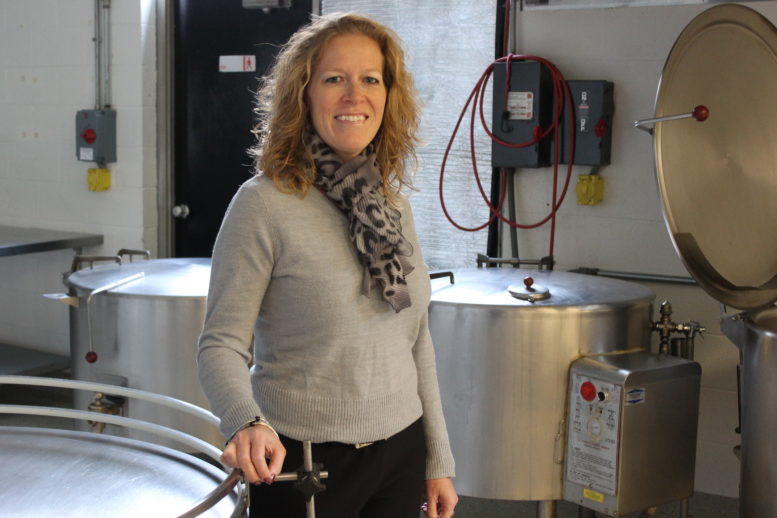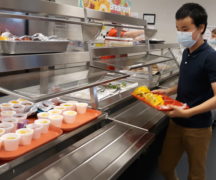By DAVID DUPONT
BG Independent News
In her new position as CEO and president of the Center for Innovative Food Technology, Rebecca Singer has to deal with the entire spectrum of the food industry, from seed to package. She brings just the right mix of experience the job requires.
Singer, who took over the leadership role about a month ago, has a degree in agri-business and applied economics from Ohio State, and she managed the state’s Ohio Proud program before taking a position with CIFT 15 years ago.
All that is grounded on the farm. She grew up on a farm in Defiance County, and when she moved back to Northwest Ohio to join CIFT, she decided settle back there.
She and her brother now manage the operation while their father stays involved in the chores he enjoys like driving the tractor.
They grow soybeans and ponder all the issues that farmers face. Do they have enough acreage for a viable soybean operation? Should they transition into vegetables and specialty crops?
“It lends a lot of authenticity that these are the kinds of things that go through our minds on our operation,” Singer said.
Like Ohio’s weather, the agriculture sector is ever changing. Recently “there’s been such a tremendous amount of interest in local foods,” she said. This effects the farmers who grow the food those who process it.
That’s been seen at CIFT’s Northwest Ohio Cooperative Kitchen outside of Bowling Green on Ohio 582. The facility serves as a launching pad for local food products.
“A lot of people enjoy making food for other people,” Singer said. “They enjoy sharing recipes that’s been passed down for generations.”
The cooperative kitchen has the equipment and expertise to help that make that happen.
CIFT can serve as “a one-stop shop” for producers, helping them identify sources of ingredients, fine-tuning their processing to make it as cost effective as possible, and adhering to food safety procedures.
Interest in using the kitchen increased with the local food movement. “It’s really exploded,” she said.
More and more people want “a clean label,” she said. They don’t want to see an ingredients list laden with artificial additives and preservatives.
Tastes will shift. It’s all about hot and spicy now. The desire for local ingredients is here to stay, she said.
Growers are straining to meet that demand. Finding labor for those few weeks when they need to harvest is a challenge, one they share with larger processors.
“We hear all the time that they can’t find help,” she said.
Finding folks who want to work hard, in the heat of summer is increasingly difficult. Mechanization can help, but harvesting still needs the human touch, she said.
The ag incubator located at the cooperative kitchen site demonstrates new technologies and methods for growing food, as well as new varieties, Singer said.
Right now the incubator is demonstrating a trellis system for growing berries, hydroponics, and hops.
The growth of micro-brewing, which also values locally sourced products, is increasing the demand for hops. “We’re trying to show growers what’s involved so they can make a decision whether this is something they want to do.”
Processing the hop crop “so it is ready for a brewer to use” is also a challenge.
That’s also something CIFT can help with, Singer said. “We’re trying to provide guidance about what needs to happen. We can accelerate people’s success and hasten the process because they have that information to build on.”
Farmers growing vegetables and specialty crops now have multiple channels through which to market their wares. Farmers once were in a quandary about finding outlets for their crops, now they’re in a quandary as to what outlet to use.
Farmers markets and farm shares continue to be strong, but probably won’t see much growth, she said.
“Really the challenge with growers, and what will make a big difference going forward, is their attention to food safety requirements,” Singer said. “Every retailer is demanding documentation when it comes to food safety practices. Growers are going to be make those decisions whether they are willing to invest in that to the degree they need to be in those markets.
“You see the same thing in food service. They’re being asked to provide information, and that in turn trickles down to growers.”
CIFT is also helping processors with supply chain management and adopting LEAN manufacturing principles to their operations.
Right now, she said, CIFT is helping manufacturers who are bringing in cheese from out of state to use more Ohio cheese. Even a small change can have a significant impact on the entire system, she said.
And that’s important for the state’s economy.
About 1,100 processors employing 75,000 people call Ohio home. That’s not including agri-business, which includes seed growers, fertilizer manufacturers and other related enterprises as well as farms.
That combination of food processing and agribusiness “really reflects a tremendous value to the state of Ohio,” Singer said.
CIFT is working to see that value increase.





